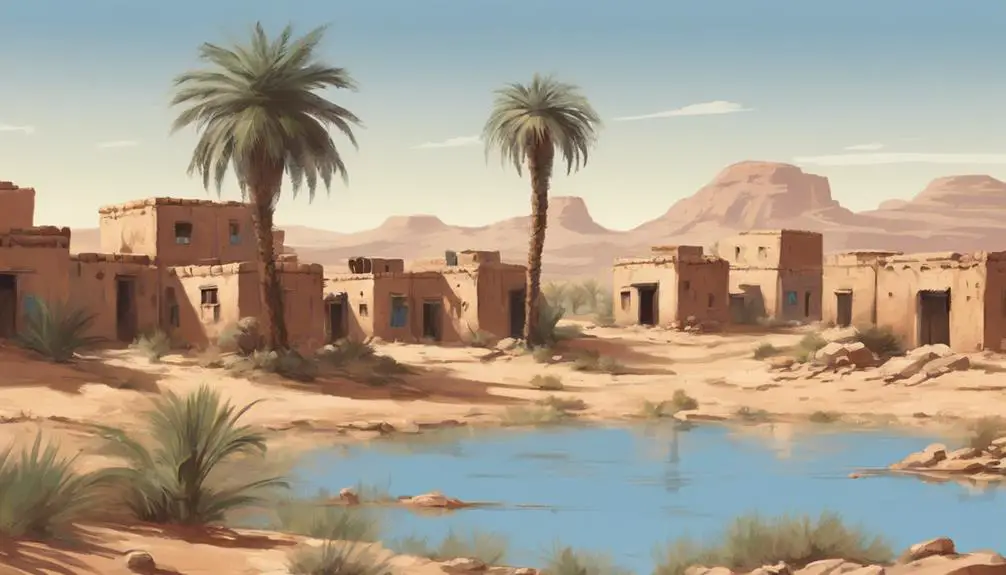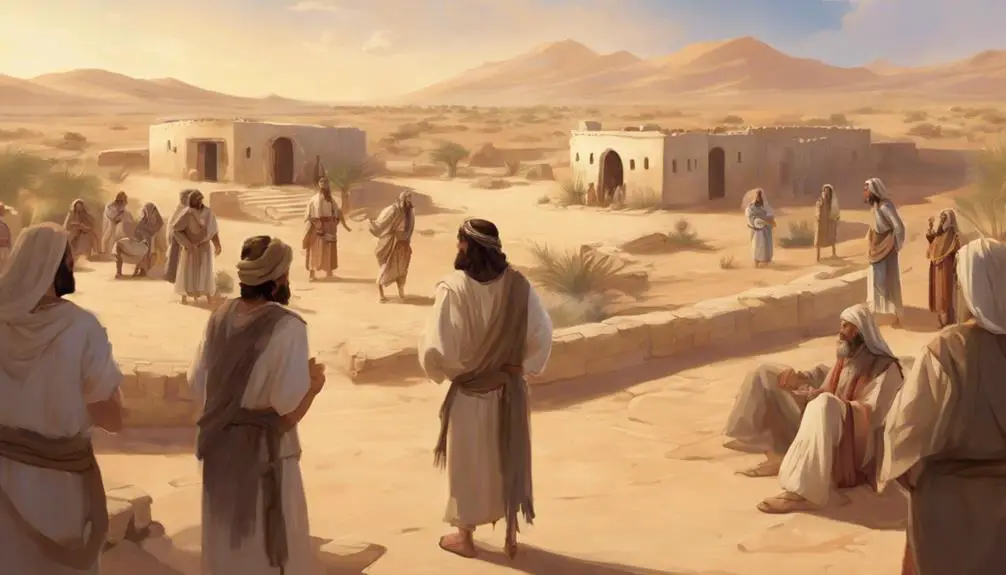Navigate the depths of Rehoboth's biblical significance, where strife turns to blessing and history whispers secrets of peace and expansion.

Meaning of Rehoboth in the Bible
In the tapestry of biblical narratives, Rehoboth stands out as a tranquil oasis amidst stories of strife and conquest. You've likely stumbled upon its name while navigating through Genesis, where its layers of meaning weave a rich tapestry of symbolism and historical significance.
Known as a place of expansion and blessing, Rehoboth symbolizes a turning point in Isaac's journey, marking an end to conflict and the beginning of prosperity. But to fully grasp its impact and relevance, you must explore the wells of contention and the legacy it has left for generations.
Unpacking its story offers insights not just into ancient times but into the enduring human quest for peace and space.
Key Takeaways
- Rehoboth symbolizes the resolution of disputes and the transition to peace and prosperity.
- It represents spiritual fulfillment and the importance of perseverance and faith.
- The name signifies expansion, unity, and the journey towards settled communities and faith.
- Wells in Rehoboth highlight the role of resource management and economic growth through divine provision.
Historical Context of Rehoboth

In exploring the historical context of Rehoboth, one observes that it emerges from the annals of biblical history as a place symbolizing dispute resolution and newfound peace. Its geographical location isn't precisely defined in contemporary terms but is broadly understood to be in the vicinity of the ancient Near East, possibly in the region now known as the Middle East. This lack of precise location, however, doesn't detract from its significance in biblical narratives, particularly in the context of ancient customs that heavily emphasized the importance of land and water sources.
Ancient customs of the time, deeply rooted in pastoral and agrarian lifestyles, underscored the value of naming places as a means of establishing ownership, marking territorial boundaries, and commemorating significant events. In this light, Rehoboth represents a significant departure from a history of conflict over resources, towards an acknowledgment of divine providence and the establishment of a peaceful coexistence. The act of naming Rehoboth, therefore, wasn't merely a geographical claim but a profound declaration of resolution and a hopeful outlook towards a future unfettered by previous disputes.
Rehoboth: A Place of Expansion

Rehoboth frequently symbolizes a transformative phase of expansive growth and prosperity in biblical narratives, reflecting its foundational role in the broader context of divine blessing and human endeavor. The term isn't merely a geographical marker but serves as a spiritual metaphor for spaces where adversity is overcome, and abundance is realized. This notion of Rehoboth as a place of expansion extends beyond physical territories to encompass urban development and spiritual growth.
In the context of urban development, Rehoboth represents the evolution from nomadic to settled communities, highlighting the transition towards agricultural stability, economic prosperity, and societal organization. It signifies the move from scarcity to abundance, from conflict to peace. As a spiritual metaphor, Rehoboth embodies the journey towards spiritual fulfillment and the expansion of faith communities. It mirrors the internal expansion of the believer's heart, making room for deeper relationships with the divine.
Through this dual lens, Rehoboth teaches that growth often follows periods of strife and that spaces of peace and prosperity are achievable with divine guidance and human resilience. Thus, it stands as a testament to the power of faith and the potential for transformation in both the physical and spiritual realms.
The Wells of Contention

Exploring further, we encounter the narrative of the Wells of Contention, a pivotal episode that underscores the challenges faced on the path to achieving Rehoboth's symbolic expansion and prosperity. This story, deeply entrenched in the annals of ancient conflicts, illustrates the perennial struggle over vital resources, with water disputes at the core.
In examining the Wells of Contention, several key elements emerge:
- Water as a Source of Life and Conflict: The wells represent not only life-sustaining resources but also focal points of contention, highlighting the critical nature of water in sustaining communities and the ease with which it becomes a source of dispute.
- Human Nature and Resource Scarcity: The conflicts over the wells underscore the human propensity to assert ownership over natural resources, leading to disputes when these resources are perceived as scarce or threatened.
- Resolution and Expansion: The resolution of these disputes eventually leads to the establishment of Rehoboth, symbolizing a move beyond conflict towards growth and prosperity.
Through these elements, the narrative of the Wells of Contention delves into the complexities of water disputes and ancient conflicts, revealing the intricate relationship between resource scarcity, human nature, and the pursuit of expansion and peace.
Isaac's Journey to Rehoboth

As Isaac navigated the challenging landscape toward Rehoboth, he encountered not only physical but also metaphorical hurdles, embodying the struggle for autonomy and prosperity amidst adversity. His journey, marked by desert wanderings, illuminates the theme of resilience in the face of conflict and scarcity. Isaac's resilience becomes apparent as he perseveres, moving from place to place in search of a peaceful existence and fertile ground for his people and livestock.
The narrative of Isaac's trek to Rehoboth unfolds against the backdrop of contested wells, symbolizing not just the quest for water, but the deeper yearning for a place where one can flourish without strife. Each phase of Isaac's journey, from the disputes over the wells of Gerar to his eventual settlement in Rehoboth, showcases his unwavering determination to secure a future for his lineage under the covenantal promise made to his father, Abraham.
This passage through arid regions and hostile territories underscores a pivotal lesson in biblical history: the attainment of peace and prosperity often requires enduring hardship and displaying steadfast faith. Isaac's desert wanderings, culminating in his arrival at Rehoboth, epitomize the enduring human spirit's capacity to overcome adversity through faith and persistence.
Symbolism and Significance

Delving into the narrative of Isaac's journey reveals a rich tapestry of symbols, each bearing significant implications for understanding biblical themes and human experience. The story of Rehoboth, in particular, is rich with symbolism, serving as a profound metaphor for divine intervention and spiritual growth. These symbols underscore the multifaceted nature of human interaction with the divine and the journey toward fulfillment and peace.
Key elements of symbolism and significance include:
- Divine Intervention: Isaac's finding of water in Rehoboth symbolizes divine provision and guidance amidst adversity. It's a testament to the belief that, even in moments of great strife, a higher power is at work, shaping outcomes beyond human control.
- Spiritual Growth: The transition from conflict to peace in Rehoboth mirrors the spiritual journey many undergo. It's an emblem of the evolution from hardship to enlightenment and the growth that occurs when one remains steadfast in faith.
- Conflict Resolution: Isaac's experiences leading to Rehoboth illustrate the importance of perseverance and diplomacy. The move from contention over wells to finding a space of their own speaks to the power of persistence and the pursuit of harmonious existence.
Analyzing Rehoboth within these contexts enriches our understanding of its enduring relevance and the timeless nature of its lessons.
Rehoboth's Legacy Today

In today's context, Rehoboth's narrative continues to resonate, offering valuable insights into the enduring human quest for peace and prosperity. The tale, rooted in Biblical lore, has transcended its ancient origins to find relevance in modern times, particularly in the realm of Rehoboth tourism and the cultural identity of Modern Rehoboth. This connection between past and present is not just academic but deeply entrenched in the social and economic fabrics of communities that bear its name.
Aspect |
Biblical Rehoboth |
Modern Rehoboth |
|---|---|---|
Meaning |
Space, Expansion |
Growth, Renewal |
Symbolism |
Peace, Prosperity |
Community, Unity |
Cultural Impact |
Spiritual Heritage |
Diverse Heritage |
Economic Role |
Agricultural Basis |
Tourism, Commerce |
Community |
Nomadic Tribes |
Global Citizens |
The table above highlights the evolution of Rehoboth's significance from a Biblical context to its modern interpretation. It underscores how the foundational themes of space, peace, and prosperity have been adapted to suit the needs and values of contemporary societies. Rehoboth tourism, in particular, exemplifies this transition, attracting visitors not just for its historical or spiritual significance, but also for the vibrant, inclusive community that Modern Rehoboth represents today.
Frequently Asked Questions
How Has the Interpretation of Rehoboth's Meaning Evolved in Different Biblical Translations Over the Years?
You've noticed that Rehoboth's interpretation has shifted due to translation methodologies and linguistic evolution. Initially, its meaning was straightforward in early translations. However, as scholars delved deeper into linguistic nuances, they've reevaluated its significance.
This evolution reflects a broader trend of biblical interpretation, where advancements in linguistic analysis and a better understanding of historical contexts lead to more nuanced translations. The changes are a testament to the dynamic nature of language and interpretation.
Are There Any Notable Archaeological Discoveries Related to Rehoboth That Have Impacted Our Understanding of Its Historical Accuracy?
Digging into the sands of time, you'll find that notable archaeological discoveries at Rehoboth have indeed reshaped our understanding of its historical context.
Advances in excavation methodologies and meticulous artifact preservation techniques have allowed scholars to piece together a more accurate picture of Rehoboth's past.
These findings not only validate historical accounts but also enrich our comprehension of the era, offering a tangible connection to the narratives long buried beneath the earth.
How Is Rehoboth Referenced or Symbolized in Contemporary Religious Practices or Ceremonies Across Different Denominations?
In contemporary religious practices or ceremonies, Rehoboth's symbolism varies across denominations, often reflected in church architecture and interfaith dialogues. You'll find its essence captured in design elements that promote peace and unity, embodying the spirit of Rehoboth's biblical narrative.
Moreover, its role in interfaith discussions highlights a shared longing for harmony and reconciliation, bridging beliefs through its historical and spiritual significance. This approach underscores a universal desire for communal and spiritual expansiveness.
Can Parallels Be Drawn Between the Story of Rehoboth and Any Similar Narratives in Other Ancient Cultures or Religions?
Ironically, you're diving into ancient tales, yet finding cultural parallels and mythological similarities between the story of Rehoboth and other ancient cultures shouldn't surprise you.
Many ancient narratives share themes of conflict, resolution, and prosperity, akin to Rehoboth's story.
Analyzing these similarities offers an insightful glimpse into how different cultures, despite geographical and temporal distances, grapple with universal themes, underscoring the interconnectedness of human experiences across civilizations.
What Role Does Rehoboth Play in Modern Theological Debates or Discussions Around the Themes of Conflict Resolution and Finding Peace?
In modern theological debates, Rehoboth symbolizes peaceful coexistence and the importance of diplomatic engagement to resolve conflicts. It serves as a paradigm, encouraging discussions on finding peace amidst adversity.
You'll find it often cited in dialogues around how to navigate through disputes, emphasizing the need for patience, understanding, and negotiation.
This narrative highlights the possibility of achieving harmony and mutual respect, even when initial attempts at resolution seem futile.
Conclusion
In conclusion, you've journeyed through the historical depths of Rehoboth, uncovering its significance as a place of expansion and resolution. Through Isaac's ventures and the wells of contention, you've seen how Rehoboth symbolizes a turning point—a respite from strife and a gateway to prosperity.
This analysis reveals Rehoboth's enduring legacy as a testament to resilience and divine provision. Today, its story continues to inspire, embodying the universal quest for peace and abundance amidst life's inevitable conflicts.



Sign up